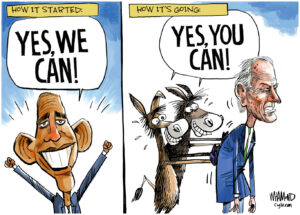‘Tis the Season for Disappointment
Of all the upsets that can sour a holiday season -- pinched wallets, contaminated toys, sugar overload and overbearing in-laws -- is there anything that can dull the spirit like a presidential primary season unfolding in its midst?WASHINGTON — Of all the upsets that can sour a holiday season — pinched wallets, contaminated toys, sugar overload and overbearing in-laws — is there anything that can dull the spirit like a presidential primary season unfolding in its midst?
Republicans argue about who can be tougher on immigrants and purer in disdain for anything resembling a tax. Democrats argue about — well, not much, really. That’s the dispiriting part. The Democratic candidates agree broadly on everything from ending the Iraq war to initiating a form of universal health insurance to rolling back the gilded Bush-era tax cuts for the wealthiest. Their argument is about who is more “polarizing,” or hogtied by contentious battles of the past.
So compelling is this “polarization” argument that it’s migrated to the Republican camp. Mike Huckabee, a former Arkansas governor and Baptist minister who openly advertises himself as a “Christian leader,” uses his religion as a tactic to thwart Mormon Mitt Romney, presented himself in the final Iowa debate among Republicans as — of all things — the un-polarizer. “We are right now a very polarized country, and that polarized country has led to a paralyzed government,” he said.
Honestly, it’s the other way around. The government is paralyzed, but is the country really polarized? Not so much.
Americans are in remarkable agreement lately on an awful lot. They agree the Iraq war was a mistake, and that the United States should start getting out. They think the economy is lousy and the country is on the wrong track. They want the government to find a way to guarantee health insurance to everyone and they overwhelmingly believe the bipartisan congressional effort to expand the State Children’s Health Insurance Program (SCHIP) is a good idea.
About three-quarters agree with this statement: “Today it’s really true that the rich get richer while the poor get poorer,” according to the 2007 Pew Research Center survey of trends in political values and core attitudes. That’s the highest level of agreement on the question since the recession year of 1991, according to Pew. And the public is right: Inequality, according to various government statistics and academic analyses, is greater now than at any time since that memorable year, 1929.
So what’s the big fight about? Paralysis does not afflict Washington because the public is split about what it wants. It’s because the politicians just won’t deliver.
President Bush refuses to go along with most of what the Democratic Congress passes, though the turnover of control on Capitol Hill in last year’s election amounted to a referendum in which voters rejected Bush’s policies. Even though many measures — most obviously, SCHIP — pass with Republican votes, Bush vetoes them. Senate Republicans block the majority Democrats from passing almost anything, by using the parliamentary tool of the filibuster — a device (dare we call it a polarizing one?) they harrumphed about taking away from Democrats when that party was the minority.
This is why the Democratic presidential debate over polarization is so phony. At this point, Barack Obama’s campaign boils down to pointing the polarization finger at Hillary Clinton. But it turns out that Obama could be just as polarizing in a general election campaign.
A blog run by political scientists at George Washington University analyzed the favorable and unfavorable ratings of the leading presidential candidates in both parties. Professor John Sides found that though Clinton is indeed the most polarizing, Obama came in second. Obama’s polarization index was even higher than that of Republican Rudy Giuliani, a figure so known for his abrasiveness in New York that the former mayor has sought to turn his congenital pique into a political virtue.
So it’s the candidates who are polarizing politics. Without them, there might well be peace on Iowa’s flat earth and good will in New Hampshire’s evergreen hills. Well, maybe.
The citizens of Iowa and New Hampshire, or rather, their local politicians, brought the holiday scourge upon themselves with the hopscotching they did to set caucus and primary dates earlier than ever. So a pox upon them, too.
And pax to those whose December has become less festive and more frustrating because of those polarizing politicians in their midst. January will be here soon.
Marie Cocco’s e-mail address is mariecocco(at)washpost.com.
© 2007, Washington Post Writers Group
Your support matters…Independent journalism is under threat and overshadowed by heavily funded mainstream media.
You can help level the playing field. Become a member.
Your tax-deductible contribution keeps us digging beneath the headlines to give you thought-provoking, investigative reporting and analysis that unearths what's really happening- without compromise.
Give today to support our courageous, independent journalists.






You need to be a supporter to comment.
There are currently no responses to this article.
Be the first to respond.